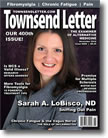|
![]()
From the Townsend Letter |
||
The Vagus Nerve's Role in Chronic Fatigue, Depression, Obesity, and Other Common Diseases by Chris D. Meletis, ND, and Kimberly Wilkes |
||
Page 1, 2 Page 1, 2 Dr. Chris D. Meletis is an educator, international author, and lecturer. His personal mission is "Changing America's Health One Person at a Time." He believes that when people become educated about their bodies, that is the moment when true change and wellness begins. Dr. Meletis served as dean of naturopathic medicine and chief medical officer for 7 years at National College of Natural Medicine (NCNM) and was awarded the 2003 Physician of the Year award by the American Association of Naturopathic Physicians. www.DrMeletis.com. Kimberly Wilkes is a freelance writer specializing in health, science, nutrition, and complementary medicine. She has written more than 300 articles covering a variety of topics from the dangers of homocysteine to sugar's damaging effects on the heart. She is the editor of Complementary Prescriptions Journal and enjoys scouring the medical literature to find the latest health-related science.
|
||
![]()
Consult your doctor before using any of the treatments found within this site.
![]()
Subscriptions
are available for
Townsend Letter, the Examiner of Alternative Medicine
magazine, which is
published 10 times each year. Search our pre-2001
archives for further information. Older issues of the printed magazine
are also indexed for your convenience.
1983-2001
indices ; recent indices. Once you find the magazines you'd like to order, please
use our
convenient form, e-mail subscriptions@townsendletter.com,
or call 360.385.6021.
360.385.6021
Fax: 360.385.0699
info@townsendletter.com
Who are
we? | New articles | Featured
topics | e-Edition |
Tables of contents | Subscriptions | Contact
us | Links | Classifieds | Advertise |
Alternative
Medicine Conference Calendar | Search site | Archives |
EDTA Chelation Therapy | Home
© 1983-2016 Townsend Letter
All rights reserved.
Website by Sandy
Hershelman Designs




